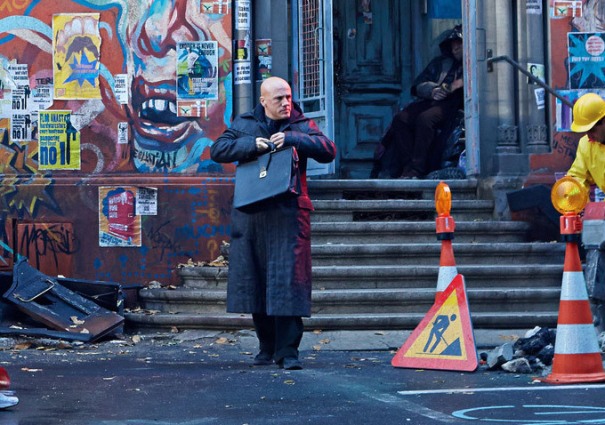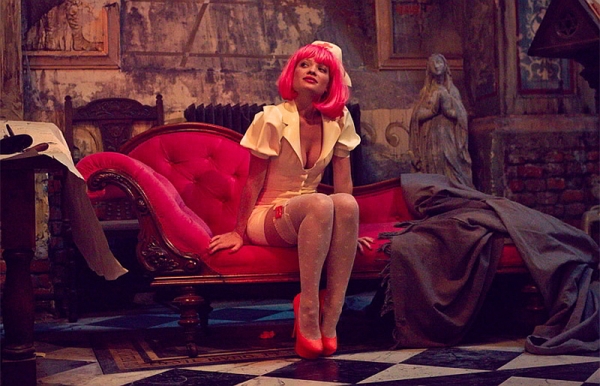The Zero Theorem | reviews, news & interviews
The Zero Theorem
The Zero Theorem
Terry Gilliam's latest is a half-hearted, undercooked self-parody
Terry Gilliam’s career currently resembles Orson Welles’ declining years, and not just in both men’s seemingly impossible quests to finish a film of Don Quixote. Gilliam too is trying to work outside a Hollywood system that has tired of his maverick talent, finding himself in far-flung European corners with motley casts of famous friends and fans, doing him favours in the hope his old lightning will strike.
The bad sort of stormy weather has, though, buffeted Gilliam since his greatly underestimated Fear and Loathing in Las Vegas, 16 years ago. The Brothers Grimm, Tideland, The Man Who Killed Don Quixote and The Imaginarium of Doctor Parnassus have all been wounded beasts; Don Quixote died, and so did Parnassus’s Heath Ledger.
 The Zero Theorem was first considered in 2009; Gilliam returned to it for want of anything better to do, when Quixote collapsed again. It was written by a fan, Pat Rushin, and is a thematic sequel to Brazil, shot in Bucharest with the director’s lowest budget since Time Bandits. It confirms the director’s latter-day problems lie closer to home than cursed productions and Hollywood philistines. The Zero Theorem is parodically Gilliamesque, offering fumbled scraps of familiar visions.
The Zero Theorem was first considered in 2009; Gilliam returned to it for want of anything better to do, when Quixote collapsed again. It was written by a fan, Pat Rushin, and is a thematic sequel to Brazil, shot in Bucharest with the director’s lowest budget since Time Bandits. It confirms the director’s latter-day problems lie closer to home than cursed productions and Hollywood philistines. The Zero Theorem is parodically Gilliamesque, offering fumbled scraps of familiar visions.
Gilliam has observed that the script’s ideas “seemed to come from every film that I’ve made”, so you can see the appeal. As computer programmer Qohen Leth, Christoph Waltz, pictured above, is the sort of miserable cog in the corporate machine Jonathan Pryce played in Brazil. Finding the garish, advert-saturated outside world insufferable, he retreats to a private Gothic chapel to work on an equation being sought by Management (Matt Damon): the Zero Theorem, which will prove the universe is meaningless. His seclusion from a reality plastered with jiggling pop-up windows is broken by manager Joby (David Thewlis) and internet porn starlet Bainsley (Mélanie Thierry, pictured below), among other irritants.
The shaven-headed Waltz plays Leth as a man almost catatonically traumatised by an over-connected reality which barely exaggerates our own. The camera’s observation of his guilty excitement as he stares at the computer and clicks onto Bainsley’s site catches something significant about our lives.
 Thewlis’s performance, meanwhile, has a Palinesque jollity which seems to have wandered over from a neighbouring Python sketch. He’s an exception to the mess the multi-national cast make of an already unfunny script. Tilda Swinton’s buck-toothed Scottish virtual psychiatrist is as embarrassingly misconceived as Thierry’s walking male fantasy’s heavily-accented stumble through her thankless lines. Wanting to distance himself from Brazil’s 1984 grey, Gilliam has also made this dystopia retina-burningly garish. Thundering through a 36-day, low-budget shoot hasn’t helped a man anyway ill-disposed to coherence. Anarchic has become zany. Bright has become blinding. Satire has become slapdash. It’s as if all his setbacks have made Gilliam lose patience, flinging paint at the canvas just to finish something, and hoping it’ll do.
Thewlis’s performance, meanwhile, has a Palinesque jollity which seems to have wandered over from a neighbouring Python sketch. He’s an exception to the mess the multi-national cast make of an already unfunny script. Tilda Swinton’s buck-toothed Scottish virtual psychiatrist is as embarrassingly misconceived as Thierry’s walking male fantasy’s heavily-accented stumble through her thankless lines. Wanting to distance himself from Brazil’s 1984 grey, Gilliam has also made this dystopia retina-burningly garish. Thundering through a 36-day, low-budget shoot hasn’t helped a man anyway ill-disposed to coherence. Anarchic has become zany. Bright has become blinding. Satire has become slapdash. It’s as if all his setbacks have made Gilliam lose patience, flinging paint at the canvas just to finish something, and hoping it’ll do.
Welles conjured the brilliant F for Fake from little more than thin air in his apparent dotage, and it would be terrible to write Gilliam off. But pretending The Zero Theorem is misunderstood genius does no one any favours. That genius has been scarce for some time.
Subscribe to theartsdesk.com
Thank you for continuing to read our work on theartsdesk.com. For unlimited access to every article in its entirety, including our archive of more than 15,000 pieces, we're asking for £5 per month or £40 per year. We feel it's a very good deal, and hope you do too.
To take a subscription now simply click here.
And if you're looking for that extra gift for a friend or family member, why not treat them to a theartsdesk.com gift subscription?
more Film
 Love Lies Bleeding review - a pumped-up neo-noir
There's darkness on the edge of town in Rose Glass's sweaty, violent New Queer gem
Love Lies Bleeding review - a pumped-up neo-noir
There's darkness on the edge of town in Rose Glass's sweaty, violent New Queer gem
 Nezouh review - seeking magic in a war
A movie that looks on the dreamier side of Syrian strife
Nezouh review - seeking magic in a war
A movie that looks on the dreamier side of Syrian strife
 Blu-ray: The Dreamers
Bertolucci revisits May '68 via intoxicated, transgressive sex, lit up by the debuting Eva Green
Blu-ray: The Dreamers
Bertolucci revisits May '68 via intoxicated, transgressive sex, lit up by the debuting Eva Green
 theartsdesk Q&A: Marco Bellocchio - the last maestro
Italian cinema's vigorous grand old man discusses Kidnapped, conversion, anarchy and faith in cinema
theartsdesk Q&A: Marco Bellocchio - the last maestro
Italian cinema's vigorous grand old man discusses Kidnapped, conversion, anarchy and faith in cinema
 I.S.S. review - sci-fi with a sting in the tail
The imperilled space station isn't the worst place to be
I.S.S. review - sci-fi with a sting in the tail
The imperilled space station isn't the worst place to be
 That They May Face The Rising Sun review - lyrical adaptation of John McGahern's novel
Pat Collins extracts the magic of country life in the west of Ireland in his third feature film
That They May Face The Rising Sun review - lyrical adaptation of John McGahern's novel
Pat Collins extracts the magic of country life in the west of Ireland in his third feature film
 Stephen review - a breathtakingly good first feature by a multi-media artist
Melanie Manchot's debut is strikingly intelligent and compelling
Stephen review - a breathtakingly good first feature by a multi-media artist
Melanie Manchot's debut is strikingly intelligent and compelling
 DVD/Blu-Ray: Priscilla
The disc extras smartly contextualise Sofia Coppola's eighth feature
DVD/Blu-Ray: Priscilla
The disc extras smartly contextualise Sofia Coppola's eighth feature
 Fantastic Machine review - photography's story from one camera to 45 billion
Love it or hate it, the photographic image has ensnared us all
Fantastic Machine review - photography's story from one camera to 45 billion
Love it or hate it, the photographic image has ensnared us all
 All You Need Is Death review - a future folk horror classic
Irish folkies seek a cursed ancient song in Paul Duane's impressive fiction debut
All You Need Is Death review - a future folk horror classic
Irish folkies seek a cursed ancient song in Paul Duane's impressive fiction debut
 If Only I Could Hibernate review - kids in grinding poverty in Ulaanbaatar
Mongolian director Zoljargal Purevdash's compelling debut
If Only I Could Hibernate review - kids in grinding poverty in Ulaanbaatar
Mongolian director Zoljargal Purevdash's compelling debut
 The Book of Clarence review - larky jaunt through biblical epic territory
LaKeith Stanfield is impressively watchable as the Messiah's near-neighbour
The Book of Clarence review - larky jaunt through biblical epic territory
LaKeith Stanfield is impressively watchable as the Messiah's near-neighbour

Add comment